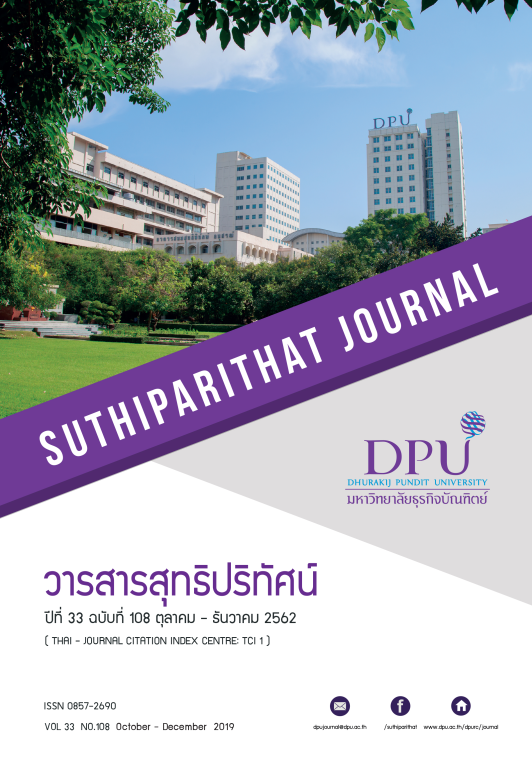เรื่องสำคัญในการตรวจสอบคุณภาพการสอบบัญชีและการจัดการกำไรของบริษัทที่เสนอขายหุ้นใหม่แก่ประชาชนทั่วไปเป็นครั้งแรกในตลาดหลักทรัพย์แห่งประเทศไทย
คำสำคัญ:
เรื่องสำคัญในการตรวจสอบ, คุณภาพการสอบบัญชี, การจัดการกำไร, การเสนอขายหุ้นใหม่แก่ประชาชนทั่วไปเป็นครั้งแรก, ตลาดหลักทรัพย์แห่งประเทศไทยบทคัดย่อ
การศึกษาในครั้งนี้มีวัตถุประสงค์เพื่อศึกษาอิทธิพลของเรื่องสำคัญในการตรวจสอบคุณภาพการสอบบัญชีที่มีต่อการจัดการกำไร โดยใช้ตัวแบบของ Modified Jones Model กลุ่มตัวอย่างที่ใช้ในงานวิจัยได้แก่ บริษัทที่เสนอขายหุ้นใหม่แก่ประชาชนทั่วไปเป็นครั้งแรก (Initial Public Offerings: IPOs) ในตลาดหลักทรัพย์แห่งประเทศไทย ยกเว้นกลุ่มอุตสาหกรรมธุรกิจการเงิน ระหว่างปี 2559-2561 จำนวน 69 บริษัท ซึ่งใช้วิธีการวิเคราะห์ความถดถอยเชิงพหุ ผลการศึกษาพบว่าคุณภาพการสอบบัญชีด้านค่าบริการอื่นของผู้สอบบัญชีมีอิทธิพลเชิงบวกกับการจัดการกำไรอย่างมีนัยสำคัญทางสถิติที่ระดับ 0.05 ผลการวิจัยจึงนำไปสู่ข้อเสนอแนะสำหรับนักลงทุนที่ต้องตระหนักถึงข้อมูลการให้บริการอื่นของผู้สอบบัญชี ซึ่งสามารถอธิบายถึงความเป็นอิสระของผู้สอบบัญชีและความเป็นไปได้ที่อาจจะเกิดการจัดการกำไรในบริษัท IPOs ได้
เอกสารอ้างอิง
กนษฐา โสดามรรค. (2554). ความสัมพันธ์ระหว่างรายการคงค้างที่ขึ้นอยู่กับดุลพินิจของผู้บริหารกับค่าสอบบัญชีของบริษัทจดทะเบียนในตลาดหลักทรัพย์แห่งประเทศไทยกลุ่มดัชนีหลักทรัพย์ SET100 ปีพ.ศ. 2553 (วิทยานิพนธ์บัญชีมหาบัณฑิต). กรุงเทพฯ: มหาวิทยาลัยธรรมศาสตร์.
กัลยา วานิชย์บัญชา, และ ฐิตา วานิชย์บัญชา. (2558). การใช้ SPSS for windows ในการวิเคราะห์ข้อมูล. กรุงเทพฯ: สามลดา.
เกรียงไกร บุญเลิศอุทัย, ศิลปพร ศรีจั่นเพชร, และอนุวัฒน์ ภักดี. (2562). เรื่องสำคัญในการตรวจสอบบอกอะไร. วารสารวิชาชีพบัญชี, 15(45), 5-25.
พิมพิศา พรหมมา, และพัทธนันท์ เพชรเชิดชู. (2561). ปัจจัยที่มีอิทธิพลต่อการกำหนดราคาหลักทรัพย์ที่เข้าจดทะเบียนครั้งแรกต่ำกว่ามูลค่าของบริษัทจดทะเบียนในตลาดหลักทรัพย์เอ็มเอไอของประเทศไทย.
สรศาสตร์ สุขเจริญสิน. (2561). การวัดระดับการพัฒนาของตลาดหลักทรัพย์ในอาเซียน. กรุงเทพฯ: คณะพัฒนาการเศรษฐกิจ สถาบันบัณฑิตพัฒนบริหารศาสตร์.
สำนักงานคณะกรรมการกำกับหลักทรัพย์และตลาดหลักทรัพย์. (2560). รายงานสรุปกิจกรรมการตรวจคุณภาพงานสอบบัญชี. สืบค้นเมื่อ 23 มิถุนายน 2562, จาก https://www.sec.or.th
Abdul Wahab, E. A., Gist, W. E., & Nik Abdul Majid, W. Z. (2014). Characteristics of non-audit services and financial restatements in Malaysia. Journal of Contemporary Accounting & Economics,10, 225–247.
Alhadab, M., & Clacher. I. (2018). The impact of audit quality on real and accrual earnings management around IPOs. The British Accounting Review, 50, 442–461.
Alhadab, M., Clacher, I., & Keasey, K. (2016). A comparative analysis of real and accrual earnings management around initial public offerings under different egulatory environments. Journal of Business Finance & Accounting, 43(7), 849–871.
Ashbaugh, H., LaFond, R., & Mayhew, B. (2003). Do non-audit services compromise auditor independence? further evidence. The Accounting Review, 78(3), 611-639.
Bamahros, Mohammed. H., Hussin, W., & Nordin, W. (2015). Non-audit services, audit firm tenure and earnings management in Malaysia. Asian Academy of Management Journal of Accounting and Finance, 11(1), 1-24.
Best, J. W., & Kahn, J. V. (2006). Research in education (10th ed.). Boston: Pearson Education, Inc.
Bloomfield, D., & Shackman, J. (2008). Non-audit service fees, auditor characteristics and earnings restatements. Managerial Auditing Journal, 23(2), 125 – 141.
Bryan, D. B., & Mason,T. W. (2016). The influence of earnings management conducted through the use of accretive stock repurchases on audit fees. Advances in Accounting, incorporating Advances in International Accounting, 34, 99–109.
Cahan, S. F., Jeter, D. C., & Naiker, V. (2011). Are all industry specialist auditors the same?. Auditing: A Journal of Practice & Theory, 30(4), 191–222.
Chen, K.Y., Lin, K.L., & Zhou, J. (2005). Audit quality and earnings management for Taiwan IPO firms. Managerial Auditing Journal, 20(1), 86-104.
Chiraz, D., & Anis, J. (2013). Earnings management and performance of French IPO companies. Journal of Accounting and Taxation, 5(1), 1-14.
Choi, A., Choi, J. H., & Sohn, B. C. (2018). The joint effect of audit quality and legal regimes on the use of real earnings management: International evidence. Contemporary Accounting Research, 35(3), 2225-2257.
Christensen, B. E., Olson, A. J., & Omer, T. C. (2015). The role of audit firm expertise and knowledge spillover in mitigating earnings management through the tax accounts. Journal of the American Taxation Association, 37(1), 3-36.
DeAngelo, L. E. (1981). Auditor size and audit quality. Journal of Accounting and Economics 3(3), 183–199.
Dechow, P., Sloan, R. G., & Sweeney, A. P. (1995). Detecting earnings management. The Accounting Review, 70(2), 193–225.
Eilifsen, A., & Knivsflå, K. (2016). The role of audit firm aize, non-audit services, and knowledge spillovers in mitigating earnings management during large equity issues. International Journal of Auditing, 20, 239–254.
Elizabeth. G., Miguel, M. M., Kay, W. T., & Maria. V. (2018). Consequences of adopting an expanded auditor’s report in the United Kingdom. Review of Accounting Studies, 23(4), 1543-1587.
Gold, A., & Heilmann, M. (2019). The consequences of disclosing key audit matters (KAMs): A review of the academic literature. Maandblad voor Accountancy en Bedrijfseconomie, 93(1/2), 5–14.
Gray, G.L., Turner, J.L., Coram, P.J., & Mock, T.J. (2011). Perceptions and misperceptions regarding the unqualified auditor’s report by financial statement preparers, users, and auditors. Accounting Horizons, 25(4), 659–684.
Hoitash, R., Markelevich, A., & Barragato, C. A. (2007). Auditor fees and audit quality. Managerial Auditing Journal, 22(8), 761-786.
Hurkx, R. P. H. (2012). The influence of industry specialist auditors’ strategy on audit quality (Working paper). Tilburg University.
Klueber, J., Gold, A., & Pott, C. (2018). Do key audit matters impact financial reporting behavior?. Retrieved March 15, 2019, from https://www.ssrn.com
Liu, J., Uchida, K., & Gao, R. (2014). Earnings management of initial public offering firms: evidence from regulation changes in China. Accounting and Finance, 54, 505–537.
Markelevich, A., & Rosner, R. L. (2013). Auditor fees and fraud firms. Contemporary Accounting Research, 30(4), 1590–1625.
Mock, T.J., Bédard, J., Coram, P.J., Davis, S.M., Espahbodi, R., & Warne, R.C. (2013). The audit reporting model: Current research synthesis and implications. A Journal of Practice & Theory, 32(1), 323–351.
Mulford, C. W., & Comiskey, E. E. (1996) . Financial warnings: Detecting earning surprises, avoiding business troubles, implementing corrective strategies. USA: John Wiley & Sons Inc.
Rezaee, Z. (2005). Causes, consequences, and deterence of financial statement fraud. Critical Perspectives on Accounting, 16(3), 277-298.
Srinidhi, B. N., & Gul, F.A. (2007). The differential effects of auditors’ nonaudit and audit fees on accrual quality. Contemporary Accounting Research, 24(2), 595–629.
Teoh, S. H., Wong, T. J., & Rao, G. R. (1998). Are accruals during initial public offerings opportunistic?. Review of Accounting Studies, 3, 175-208.
Ye, P., Carson, E., & Simnett, R. (2011). Threats to auditor independence: the impact of relationship and economic bonds. Auditing: A Journal of Practice & Theory, 30(1), 121-148.
Zhou, J., & Elder, R. (2003). Audit firm size, industry specialization and earnings management by Initial Public Offering Firms (Working paper). USA: Syracuse University.
ดาวน์โหลด
เผยแพร่แล้ว
รูปแบบการอ้างอิง
ฉบับ
ประเภทบทความ
สัญญาอนุญาต
เนื้อหาและข้อมูลในบทความที่ลงตีพิมพ์ในวารสารสุทธิปริทัศน์ ถือเป็นข้อคิดเห็นและความรับผิดชอบของผู้เขียนบทความโดยตรงซึ่งกองบรรณาธิการวารสาร ไม่จำเป็นต้องเห็นด้วย หรือร่วมรับผิดชอบใด ๆ
บทความ ข้อมูล เนื้อหา รูปภาพ ฯลฯ ที่ได้รับการตีพิมพ์ในวารสารสุทธิปริทัศน์ ถือเป็นลิขสิทธิ์ของวารสารสุทธิปริทัศน์หากบุคคลหรือหน่วยงานใดต้องการนำทั้งหมดหรือส่วนหนึ่งส่วนใดไปเผยแพร่ต่อหรือเพื่อกระทำการใด ๆ จะต้องได้รับอนุญาตเป็นลายลักษณ์อักษรจากวารสารสุทธิปริทัศน์ก่อนเท่านั้น







